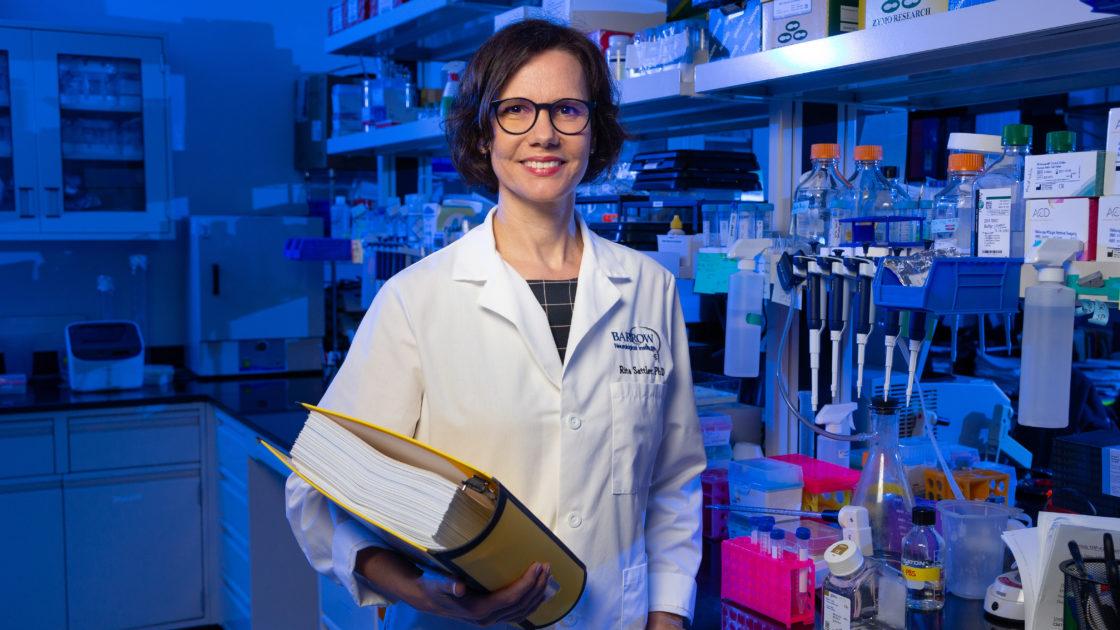
R01 Grant Supports Further Study of Role of Immune Cells in ALS, FTD
The National Institutes of Health has awarded an R01 grant to Rita Sattler, PhD, and her team of investigators to fund their research on the role of microglia in neurodegenerative diseases.
The grant, totaling $4,073,311, is specifically for amyotrophic lateral sclerosis (ALS) and frontotemporal dementia (FTD). These diseases both involve the deterioration and death of neurons, and they often coexist in patients.
Microglia are the resident immune cells of the brain and spinal cord. Normally, these cells eliminate foreign invaders and clean up accumulating waste left behind by cells performing their normal functions. But during the aging and disease processes, microglia appear to become destructive rather than protective.
Autopsy studies have shown that microglia become activated in individuals with ALS and FTD. However, scientists don’t yet fully understand how microglia function and dysfunction might impact the health and survival of neurons, especially during disease. Further study of the relationship between these cells could help scientists identify targets for future drug therapies.
Destruction of Synapses
Neurons are the cells in the brain and spinal cord that transmit information through electrical impulses and chemical signals. They communicate with each other at junctions called synapses. This communication ultimately enables us to do everything from walking and talking to learning and forming memories.
“One interesting aspect of microglia-neuron communication is the role of microglia in the maintenance and refinement of synaptic networks through the selective pruning of synapses,” Dr. Sattler said.
This typically occurs during development. However, it appears to also be triggered in Alzheimer’s disease and other dementias, such as FTD.
The degree of synapse loss in Alzheimer’s strongly correlates with cognitive decline, even more than the amount of amyloid plaques, tau tangles, or neuronal loss.
A recent autopsy study of ALS patients with reported cognitive impairments confirmed increased synapse loss in the very front part of the cortical forebrain. Known as the prefrontal cortex, this part of the brain plays a crucial role in cognitive functions. These include planning, short-term memory, and decision-making.
C9orf72 Effect
Research performed by the Sattler Laboratory, in close collaboration with Cedars-Sinai Medical Center, linked the destructive behavior of microglia to a mutation in the C9orf72 gene. Mutations in this gene are the most prevalent known cause of ALS and FTD.
This data supports the lab’s hypothesis that people with FTD and mutations in C9orf72 have altered neural-immune interaction in the cortical forebrain. In other words, the microglia and neurons modify each other’s function.
To investigate the contribution of microglia to cortical neuron degeneration, the researchers will use human patient-derived models. These models consist of blood or skin cells that have been donated by adult patients and reprogrammed into brain cells. Researchers call them induced pluripotent stem cells, or iPSCs.
“We will analyze these iPSC-microglia to better understand the function and genetic profiles of microglia,” Dr. Sattler said, “Then, for the first time, we will co-culture the iPSC-microglia with both diseased and healthy iPSC-cortical neurons.”
Scientists use co-culturing to evaluate complex interactions between two cell types in different environments. This study will allow Dr. Sattler’s team to better understand how microglia and neurons affect one another.
Finally, the team will explore microglia activation and its role in disease through autopsy studies of patients with mutated C9orf72. They will apply different methods, including examining the control center (nucleus) of microglia and utilizing visualization techniques, to unravel the overactive immune response.
Dr. Sattler is working closely with co-principal investigator Kendall Van Keuren-Jensen, PhD, from the Translational Genomics Research Institute (TGen). Other investigators include Tania Gendron, PhD, from the Mayo Clinic in Florida, and Justin Ichida, PhD, from the University of Southern California.
